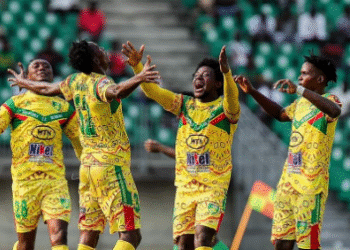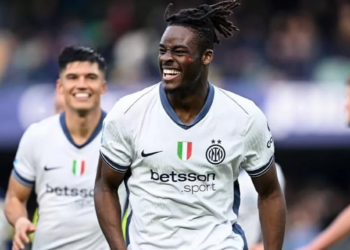Le cèlèbre quotidien américain, New York Times, n’a jamais sollicité pour interview, ni accordé une pleine page à un sélectionneur d’un pays africain. Celui du Cameroun a brisé cet état de faits en ce mois de novembre. Probablement aiguillonné par l’actualité abrasive autour de la sélection nationale, le média américain a contacté le technicien Belge pour savoir comment se passe sa journée de travail dans la marre à scorpions qu’est la tanière.
Celui dont la Fécafoot et Samuel Eto’o deteste, malgré des questions tendancieuses, n’a pas souhaité créer de remous supplémentaires. Il s’est certainement rappelé au souvenir de celle accordé au média belge DH en août dernier.
Camfoot.com publie ici l’entièreté de cet entretien dans sa langue originale.
Cameroon head coach Marc Brys: ‘My father told me to stand my ground. So that’s what I did’
The serenity of his Greek island surroundings contrasts with a difficult introduction as head coach of the African nation seven months ago.
“Within three days it went wrong,” he says with a smile, recalling the moment he came face to face with Cameroon Football Federation (Fecafoot) president Samuel Eto’o for the first time. “I felt I was being fought against and not welcomed. But my father always told me when I was young, ‘Ne recule pas’ — don’t back down; don’t run away. Stand your ground. So that’s what I did.”
Marc Brys, Cameroun Head Coach
The clip of the heated exchange at the Fecafoot headquarters went viral. The crux of Eto’o’s ire was that Brys — former head coach Rigobert Song’s successor — was appointed by Cameroon’s ministry of sport instead of the organisation he had led since 2021.
Brys does not want to reopen old wounds and now puts it down to “a misunderstanding” rather than genuine malice. Eto’o wanted to bring in his own man but there was a public truce between Brys and the former Barcelona and Inter Milan striker, with Eto’o apologising at a conciliatory press conference.
There were a “lot of emotions” in their previous “unfortunate” encounter, said the former Cameroon international who remains the nation’s record goalscorer (56) and joint-second on the all-time appearance list (118 caps, level with Geremi and behind Song’s 137).
Brys, 62, went through a three-stage interview process — led by the sports ministry — with around 40 other candidates. He’d also been involved in the recruitment process for the Ghana job. He wasn’t aware of the friction between the government and Cameroon’s football federation. “I’ve never experienced anything like this. I felt like I was in the middle of a conflict that didn’t concern me,” he says. “I couldn’t understand it, to be honest.”
During his playing days in Belgium, Brys also spent time in the police force. His calm disposition came in handy amid a difficult start. “You fall back on things that you learnt, it’s in your subconscious,” he explains. “You don’t get angry, you don’t want a fight — these emotions are blocked.
“I didn’t want things to escalate, but I wanted to make it clear that I don’t walk away. It was important the players saw this too and it was a point that they appreciated.” He wanted to do things his way, including keeping certain areas sacrosanct. “In the past people would jump into the dressing room so I blocked it in my contract,” says Brys. “It’s my home, the players’ home. Where we have to be safe, dare to talk about everything. It’s a much better environment.”
Marc Brys
There were issues related to travel, training schedules, stadiums and equipment that followed. But Brys has tried — as much as possible — not to let it faze him.
“There has been disruption to our work but do I fight or focus on my work? The choice is to work and not concentrate on the annoying things and be angry,” he says. “I keep my intensity on the work with the players. I don’t let things like that suck the energy.”
Accreditation issues, with staff members missing from match applications, have cropped up too. Before facing Angola in June — during Brys’ first international break — Manchester United’s Andre Onana didn’t have a goalkeeping coach to warm him up. More recently, Brys’ assistant, Joachim Mununga, had to watch from the stands for several games.
“Business-like, with respect,” is how Brys describes his relationship with Eto’o now. “It’s categorised by mutual respect and cooperation.”
Being unbeaten in six games, qualifying for AFCON and sitting top of World Cup qualification helps. “They (Fecafoot) are also positive. They see that it works. They see that they can’t throw us out. They see that we are getting results the way we do things for the country.”
Eto’o and Fecafoot have been approached for comment.
It’s Brys’ first foray into international management after 25 years of club football — predominantly in Belgium, with spells in the Netherlands and Saudi Arabia. The move to the Mediterranean with his Cretan wife and six-year-old son coincided with a desire to try something different.
“Club football can be a non-stop story and I wanted to see — with less involvement with the team — whether I could still perform and have the right impact,” he says. “This was a personal challenge. But it’s not solo work, I work with my staff, with a big group of people around the players. It’s a collective approach.” After the divisive opening days of his tenure, there was little time with the team before his first international in June against Cape Verde. He kept it simple.
“I checked before our three training sessions that 60 per cent of goals in Africa were coming from set pieces, so I invested in that,” he explains. “We won 4-1 and three came from set pieces. So God was with us. But it was good to convince everyone that someone has come with an idea.”
It helped set the tone. “In difficult situations, you want to show that you can work with your team and we, together, can isolate ourselves mentally (away from distractions),” he says. “In the beginning, I was thinking, ‘Is it going to succeed or not?’. But if I don’t believe in myself, nobody does.”
Empowering the Cameroon players to be brave was one of his key messages. “I wanted to bring the team confidence,” he says. “I remember (Napoli midfielder) Frank Anguissa coming to me and saying that he liked that they were being challenged to go and dare. To dribble, to shoot three or four times to try and score. He said he preferred that way. I’d rather players dare; don’t be nice and safe for your stats.”
That approach led to DC United’s Boris Enow capping his debut with a first international goal from a brilliant long-range free kick against Kenya during the October international break. In training, I’d seen that he could do good things, so when he came on and we got a chance, I told him, ‘You take it, no one else’,” he recalls. “It’s great that he dared to do it, with no experience whatsoever, with big players around him. I adore this. These are the things to cherish.”
Enow is one of several new faces that Brys integrated. “I wanted to inject some youth and some from abroad,” he says. Like Brighton’s Carlos Baleba, whom Brys gave his debut in his first match in charge. “He’s just 20 and he’s a superstar in the making. Players like this don’t come around that often, but when you can bring in a player like that, it’s a good example of a quality player that can help us exceed our previous level,” he says. “If I want a player, I bring him — no one can counter or block this. I have talks with my bosses about my selections but it’s also important that I, and my staff, can show we know what to do.” AFCON qualification was secured thanks to three wins from four group games with just one goal conceded. The road to the 2026 World Cup is looking good too: Cameroon are top and unbeaten in Group D before the resumption of qualifiers in March, which includes a meeting with second-placed Libya.
“I want progression, I want my team to continue to respect each other, and I’m always asking them to be better,” he says. “I’m not sitting on my arse; I love my job and I’m busy working hard too. If you just think that things will be good without effort, you’ll be dead. Lose a few games and people will be shouting at you. We have to perform and we will.”
The next AFCON tournament is in Morocco in 2025. Brys will aim to emulate compatriot Hugo Broos’ achievement in 2017 of lifting the trophy with Cameroon.
“It would be an honour and a huge achievement to follow in his footsteps,” he says. “We have to believe in ourselves. We don’t have to be busy with things on the outside. When we win (any game) for 30million Cameroonian people it’s, ‘Hallelujah’. It’s a feast and this is nice to see. I know it’s a huge honour for the players. I know they earn big money for their clubs, but they are very proud for their country, their generation, and that is our challenge.”
From a fractured start to his reign, he has fostered unity within the team: “The players have rediscovered the pleasure to come to their country, to play together with confidence and hang out with each other. That gives us great strength to move forward.”
Adam Leventhal, New York Times












